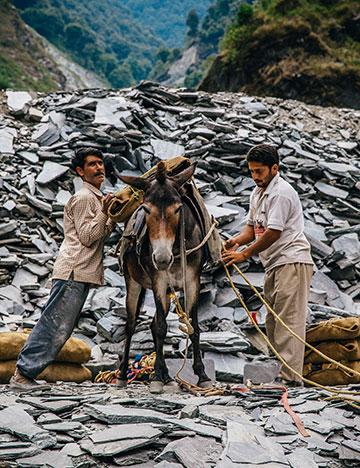In the slate mines of India
High up in the slate mines of Khanayara, in Himichal Pradesh, the air is thin and the track is steep and covered in small rocks and slate – it’s a difficult environment for both people and animals to navigate.
The terrain is slippery and rocky, making mules prone to lameness
Pawan, his three mules and three horses work in these slate mines every day. They have to walk 8km for over three hours each day, collect slate, and then walk back to Pawan’s village where he will sell it to local construction companies. He earns around 1200 INR per day (just under £12).
The main welfare issues his animals face are respiration problems, caused by the long walks and the changing climate, and lameness from the rough terrain.

Brooke India started working in this area in 2013. Talking to owners at work can be difficult as they are almost always moving, so to tackle welfare problems the team has started holding monthly meetings in the local villages. To build a rapport with the owners, they started with emergency treatment, and then moved on to providing training in farriery, proper feeding, grooming and maintenance.
The Brooke team discovered that another main cause of illness and disease came from dirty stables - an unsafe environment that can also cause accidents and lameness. They showed Pawan and other owners how a tidy stable means healthier animals and less lost in earnings.
I am more careful with welfare issues now - in the past my horses might lose a shoe and I wouldn't replace it, now I take care of it immediately every time so they don't get lame.
Pawan said "I am more careful with welfare issues now - in the past my horses might lose a shoe and I wouldn't replace it, now I take care of it immediately every time so they don't get lame."
Mansingh Kapoor, Brooke India’s project manager in the area, is pleased with the improvements they have made but feels they still have a lot of work to do. "It's still hard to get the message through to people - they're busy on the job, and there are 800 - 1000 of them working in this area.
“It's hard to speak to all the owners, so we need more resources in order to create, say, an equine welfare group in the area."
Equine welfare groups consist of local people and are led by Brooke trained veterinary assistants. They are dedicated to improving equine welfare in their communities, teaching fellow animal owners how to prevent welfare issues, and sometimes setting up insurance schemes that everyone pays into, so there’s never a time when they can’t afford to treat a sick or injured animal.
Community engagement like this is at the heart of our work on the ground. In future, Brooke wants to put even more emphasis on this, cutting out the initial free treatment, and instead training up local health providers, giving them better skills so that they can provide emergency treatment themselves.
See also
Improving the welfare of working animals means working closely with owners, their families and the wider community. This ensures improvements made to welfare are owned locally with guidance provided by Brooke and our partners.
The sub-continent is home to an estimated 1.2 million working horses, donkeys and mules. India has been a key country for our work with Brooke India established in 1992 - an affiliate with its own board of trustees.
